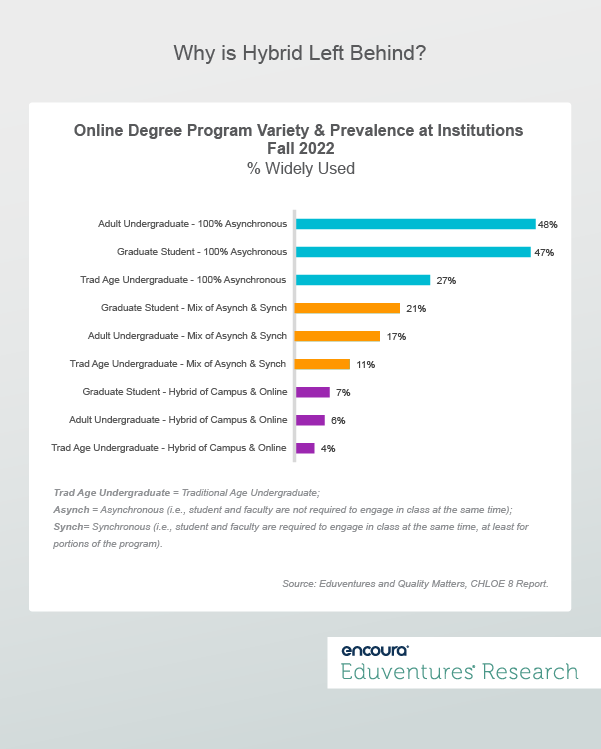The new CHLOE report comes out today. Now in its eighth edition, CHLOE, which stands for the Changing Landscape of Online Education, is a survey of chief online officers at colleges and universities, chronicling everything from programming trends to faculty development. CHLOE is a partnership between Eduventures and Quality Matters.
To mark the new report, we want to focus on what the latest CHLOE findings say about hybrid programming and adult undergraduates. This market needs a re-think: adult undergraduate enrollment is down 35% over the past decade. Conventional wisdom says that more online programming is what will convince adults to enroll, but what if hybrid is the answer?
Hybrid Hope
The combination of online and on campus appeals to prospective adult learners. For years, respondents to the Eduventures Adult Prospect Research™ Survey have favored hybrid: in 2022, a third of prospective adult undergraduates preferred fully online, but 52% wanted a combination of online and on campus.
Hybrid also wins on outcomes. A 2018 study, Making Digital Learning Work, examined student trajectories at schools including Georgia State University and University of Central Florida. It concluded that learners who mixed online and on campus modalities received higher grades.
The famous meta-analysis published in 2008 by the U.S. Department of Education found that hybrid trumped both online and on campus, helping end the “50% Rule” that denied federal student aid to fully online programs.
The CHLOE 8 report offers more support for hybrid. When asked about adult undergraduate enrollment, chief online officers report that hybrid programs are almost 50% more likely than on campus programs to show growth over the prior year (27% of hybrid programs vs. 19% for on campus).
At schools where hybrid programming for adult undergraduates is “widely used,” an even higher ratio of online leaders (38%) say enrollment grew.
If prospective adult undergraduates are enthusiastic, research is supportive, and online leaders cite enrollment momentum, do chief online officers say that hybrid is now booming? Well, no.
Hybrid Hype
Chief online officers point to increased interest in on campus alternatives among all student types. But when asked how they were responding to this trend, 56% said developing more online courses was a top priority. Only 8% said the same for hybrid.
According to CHLOE 8, few schools have made a strategic investment in hybrid to date (Figure 1).
Regardless of student type, asynchronous online consistently ranks higher than mixed or hybrid.
Almost half of chief online officers say that 100% asynchronous online learning is “widely used” in their adult undergraduate programs compared to only 6% for hybrid.
Programs for adult undergraduates and graduate students show the highest levels of fully asynchronous online activity.
But adult undergraduates and graduate students are not the same. The latter have a proven academic track record and are typically engaged in relatively short master’s programs, making a novel modality less daunting. Adult undergraduates are less accomplished and tend to be enrolled in much longer bachelor's programs. Does it make sense to offer the same fully online, asynchronous diet to such different populations?
Hybrid Hard
Hybrid supply and demand are mismatched for three main reasons:
- Design Complexity. There is a design simplicity to single delivery mode. Hybrid requires thinking through the affordances of different modalities.
- Theory vs. Practice. Hybrid sounds ideal to prospective students in theory but is logistically challenging in practice. Facing job pressures and family demands, convenience trumps (an inconvenient) pedagogical variety.
- Cost & Reach. Logistical challenges beset schools as well, eating up scarce resources and pushing up price. With consumer demand weak and competition stiff, schools see more risk than reward in hybrid, and worry that hybrid limits market reach.
In a decentralized institutional environment, schools often think of modality as a matter of student and faculty preference rather than pedagogical fit or institutional brand. This positions hybrid efforts as “anywhere, anything” rather than as a clear and compelling experience.
Prospects say they want hybrid but then enroll online. Schools say they value hybrid but then launch more online programs.
CHLOE 8 found that fully online programs for adult undergraduates outperformed hybrid: 50% of online leaders said their online programs grew vs. 27% for hybrid, and the growth ratios are 57% vs. 38% for schools where fully online vs. hybrid are “widely used.”
And in the Eduventures 2022 Adult Prospect Survey, adult undergraduate prospect interest in online grew at the expense of hybrid.
The Bottom Line
Online helped slow adult learner decline but has not reversed it. Online leaders have plenty of reasons to be skeptical about “more online.” Federal undergraduate completion data shows a negative association with online delivery. Fully online programming weakens the bonds between school and student, which—student attrition aside—may be risky for schools long-term if the affinity between local students and online programming starts to break down. It is harder for schools to differentiate themselves with online learning alone.
But is limited hybrid development a lack of demand or supply?
A few schools have rolled out hybrid experiments, such as Georgia Tech’s Atrium model and Arizona State University’s ASU Synch, but there is not much evidence of momentum.
As more schools combine on campus and online pieces to the student experience, perhaps “hybrid” will emerge bottom-up rather than top-down. Work settings, whether work experience as part of a program or a student’s job to make ends meet, could be the offline complement to increasingly online coursework. Surely the imprecise “hybrid” label is part of the problem.
CHLOE 8 underlines the hybrid conundrum, suggesting both unrealized potential and practical barriers. CHLOE 9 will dig into how online leaders see hybrid pros and cons. If adult undergraduate enrollment keeps falling, online leaders may start to pay more attention to hybrid.
We invite you to enjoy the CHLOE 8 report. Contact your Client Research Analyst to discuss hybrid opportunities and any other topic in this latest edition.
Never Miss Your Wake-Up Call
Learn more about our team of expert research analysts here.
Eduventures Chief Research Officer at Encoura
Contact
The eighth installment of the Changing Landscape of Online Education (CHLOE) report, produced by Quality Matters™ and Eduventures®, offers an overview of the current state of online learning in higher education as well as insights into its future development. The report was compiled by surveying chief online officers (COOs) — the professionals best situated to assess the current state of this ever-developing field — at U.S. two- and four-year colleges and universities.


